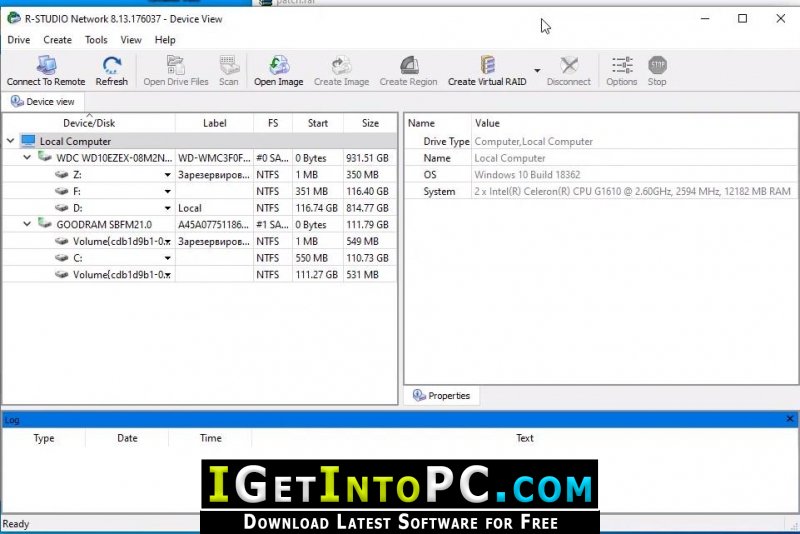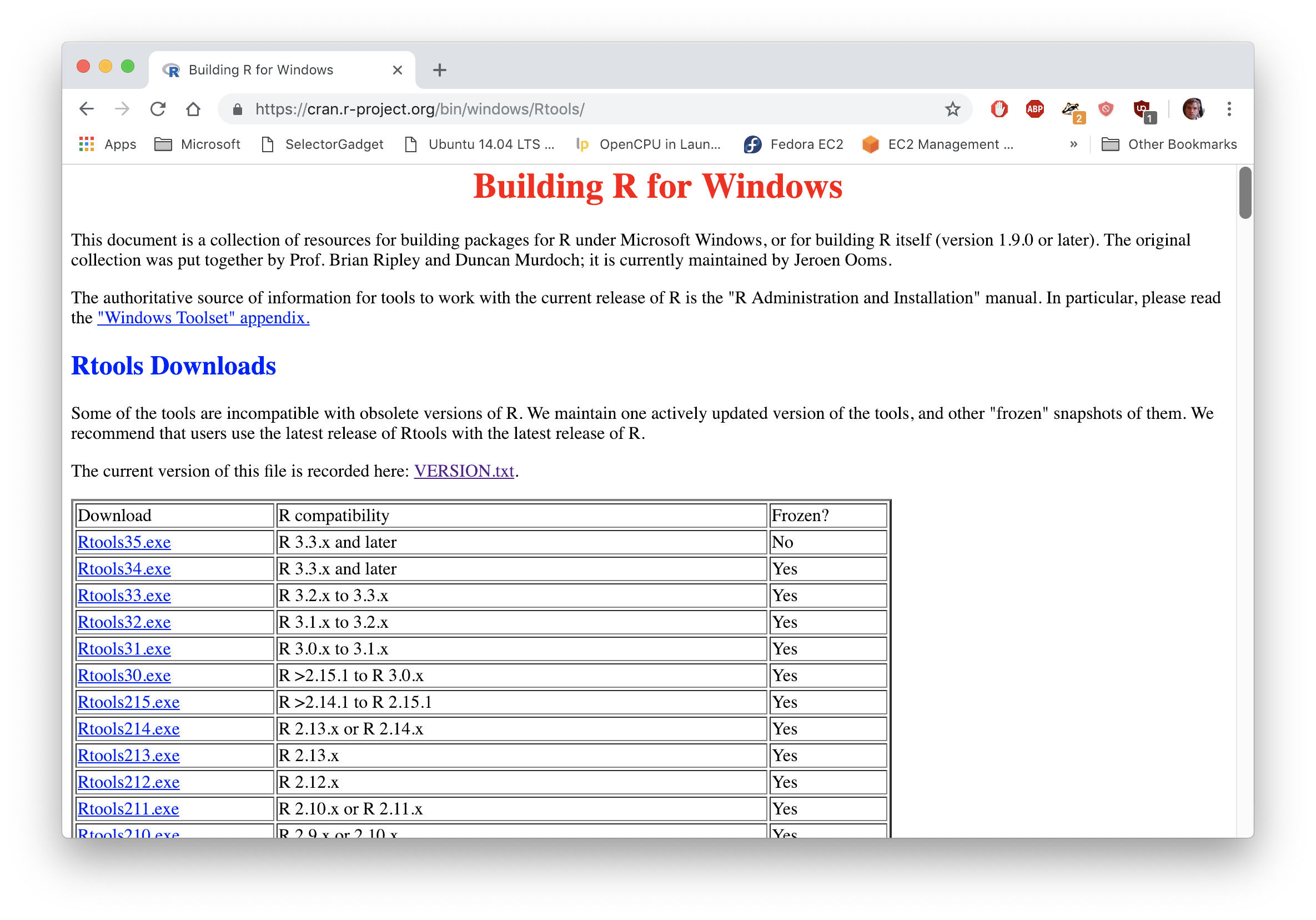Download R Tools
The R tool is a code editor for users of R, an open-source code base used for statistical and predictive analysis. Proficiency in R scripting is recommended before using this tool. FLIR Tools® is a powerful, free software solution that allows you to quickly import, edit, and analyze images, and turn them into professional PDF inspection reports. It’s the most effective way to show clients or decision-makers the problems you found with your FLIR thermal imager, and get the 'go-ahead' for repairs fast. The app allows you to: thermally tune level and span, change color. The program is included in Development Tools. Our antivirus scan shows that this download is malware free. Rtools is developed for Windows XP/Vista/7/8/10 environment, 32 and 64-bit versions. The program's installer files are generally known as McDonalds.RTools.Offline.exe, msys2.exe, OTMClient.exe, OTMLancher.exe or RTools.exe etc. Visual Studio Tools R Tools for Visual Studio 2019. R Tools for Visual Studio 2019 Preview. Mikhail Arkhipov 7,724 installs (7) Free. R Tools for Visual Studio 2019 (by Mikhail Arkhipov) Download. Overview Q & A Rating & Review. R Tools for Visual Studio 2019 (port of RTVS 2017 by Mikhail Arkhipov).
By R-tools Technology. Try fully functional version of the software for 30 days absolutely free and verify all R-Drive Image capabilities. R-Drive Image is a potent utility providing disk image.
Inspired by R and its community
The RStudio team contributes code to many R packages and projects. R users are doing some of the most innovative and important work in science, education, and industry. It’s a daily inspiration and challenge to keep up with the community and all it is accomplishing.
Managing Packages
If keeping up with the growing number of packages you use is challenging, consider RStudio Package Manager.
Analyse & Explore
The tidyverse is an opinionated collection of R packages designed for data science. All packages share an underlying philosophy and common APIs.
 Project Site Link
Project Site Link ggplot 2 is an enhanced data visualization package for R. Create stunning multi-layered graphics with ease.
Project Site Linkdplyr is the next iteration of plyr, focussing on only data frames. dplyr is faster and has a more consistent API.
 Project GitHub Link
Project GitHub Link tidyr makes it easy to “tidy” your data. Tidy data is data that’s easy to work with: it’s easy to munge (with dplyr), visualise (with ggplot2 or ggvis) and model (with R’s hundreds of modelling packages).
Project Paper Linkpurrr enhances R’s functional programming (FP) toolkit by providing a complete and consistent set of tools for working with functions and vectors.
Project Site LinkA consistent, simple and easy-to-use set of wrappers around the fantastic 'stringi' package.
Project Site LinkCommunicate & Interact
Shiny makes it incredibly easy to build interactive web applications with R. Shiny has automatic “reactive” binding between inputs and outputs and extensive pre-built widgets.
Project Site Linkrmarkdown lets you insert R code into a markdown document. R then generates a final document, in a wide variety of formats, that replaces the R code with its results.
Project Site LinkUse flexdashboard to publish groups of related data visualizations as a dashboard.
Project Site LinkDownload R Tools For Mac
Model & Predict
TensorFlow™ is an open-source software library for Machine Intelligence. The R interface to TensorFlow lets you work productively using the high-level Keras and Estimator APIs and the core TensorFlow API.
Project Site LinkThe tidymodels framework is a collection of packages for modeling and machine learning using tidyverse principles.
Project Site LinkSparklyr provides bindings to Spark’s distributed machine learning library. Together with sparklyr’s dplyr interface, you can easily create and tune machine learning workflows on Spark, orchestrated entirely within R.
Project Site LinkConnect & Integrate
Sparklyr is an R interface to Apache Spark, a fast and general engine for big data processing. This package connects to local and remote Apache Spark clusters, a ‘dplyr’ compatible back-end, and an interface to Spark’s ML algorithms.
Project Site LinkPlumber enables you to convert your existing R code into web APIs by merely adding a couple of special comments.
Project Site LinkThe reticulate package provides a comprehensive set of tools for interoperability between Python and R.
Project Site LinkAdditional Resources
Ursa Labs is an industry-funded development group specializing in open source data science tools. It is dedicated to advancing the state of the art in high-productivity, high-performance, cross-language software for data scientists.
Project Site LinkDatabases using R
Project Site LinkThe aim of devtools is to make your life as a package developer easier by providing R functions that simplify many common tasks. R packages are actually really simple, and with the right tools it should be easier to use the package structure than not. Package development in R can feel intimidating, but devtools does every thing it can to make it as welcoming as possible. devtools comes with a small guarantee: if because of a bug in devtools a member of R-core gets angry with you, I will send you a handwritten apology note. Just forward me the email and your address, and I'll get a card in the mail.
devtools is opinionated about how to do package development, and requires that you use roxygen2 for documentation and testthat for testing. Not everyone agrees with these opinions, and they are by no means perfect, but they have evolved during the process of writing over 30 R packages. I'm always happy to hear about what doesn't work for you, and any places where devtools gets in your way. Either send an email to the rdevtools mailing list or file an issue.
Updating to the latest version of devtools
You can track (and contribute to) development of devtools at https://github.com/hadley/devtools. To install it:
Install the release version of
devtoolsfrom CRAN withinstall.packages('devtools').- Make sure you have a working development environment.
- Windows: Install Rtools.
- Mac: Install Xcode from the Mac App Store.
- Linux: Install a compiler and various development libraries (details vary across differnet flavors of Linux).
Follow the instructions below depending on platform.
Mac and Linux:
Windows:
Package development tools
All devtools functions accept a path as an argument, e.g. load_all('path/to/path/mypkg'). If you don't specify a path, devtools will look in the current working directory - this is recommend practice.
Frequent development tasks:
load_all()simulates installing and reloading your package, loading R code inR/, compiled shared objects insrc/and data files indata/. During development you usually want to access all functions soload_all()ignores the packageNAMESPACE.load_all()will automatically create aDESCRIPTIONif needed.document()updates documentation, file collation andNAMESPACE.test()reloads your code, then runs alltestthattests.
Building and installing:
install()reinstalls the package, detaches the currently loaded version then reloads the new version withlibrary(). Reloading a package is not guaranteed to work: see the documentation tounload()for caveats.build()builds a package file from package sources. You can can use it to build a binary version of your package.install_github()installs an R package from github,install_gitorious()from gitorious,install_bitbucket()from bitbucket,install_url()from an arbitrary url andinstall_file()from a local file on disk.install_version()installs a specified version from cran.
Check and release:
check()updates the documentation, then builds and checks the package.build_win()builds a package using win-builder, allowing you to easily check your package on windows.run_examples()will run all examples to make sure they work. This is useful because example checking is the last step ofR CMD check.check_doc()runs most of the documentation checking components ofR CMD checkrelease()makes sure everything is ok with your package (including asking you a number of questions), then builds and uploads to CRAN. It also drafts an email to let the CRAN maintainers know that you've uploaded a new package.
Download R Tools For R Studio
Other commands:
bash()opens a bash shell in your package directory so you can use git or other command line tools.wd()changes the working directory to a path relative to the package root.
Development mode
Calling dev_mode() will switch your version of R into 'development mode'. In this mode, R will install packages to ~/R-dev. This is useful to avoid clobbering the existing versions of CRAN packages that you need for other tasks. Calling dev_mode() again will turn development mode off, and return you to your default library setup.
Other tips
I recommend adding the following code to your .Rprofile:
See the complete list in ?devtools
This will set up R to:
- always install packages from the RStudio CRAN mirror
- ignore newlines when
browse()ing - give minimal output from
traceback() - automatically load
devtoolsin interactive sessions
Alteryx Download R Tools
There are also a number of options you might want to set (in .Rprofile) to customise the default behaviour when creating packages and drafting emails:
Download R Build Tools
devtools.name: your name, used to sign emailsdevtools.desc.author: your R author string, in the form of'Hadley Wickham <h.wickham@gmail.com> [aut, cre]'. Used when creating defaultDESCRIPTIONfiles.devtools.desc.license: a default license used when creating new packages